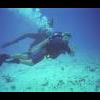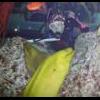Rescue Diver Training
#16

Posted 08 August 2005 - 06:20 PM
#17

Posted 09 August 2005 - 01:16 AM
I agree... When the pressure is on, it is extremely difficult to remember even a little of what to do. And in the mock rescues it's merely the pressure of not looking goofy in front of your buddies, and not getting an ***-chewing. Imagine the pressure of a real diving incident/accident.Just fininshed with rescue this weekend, a very enjoyable dive class I feel you will not have any problems, just be prepared to be frustrated at times. Just remember to have a great time.
For example, I rushed into the water in such a hurry, that I had forgotten to connect my inflator hose, and this was even when I remembered to stop and do an equipment check with my buddy.
In another example, I forgot to give a dehydrated DCS victim any water. Duh.
Taking command is very difficult as well.. People are looking at you. "Tell us what to do". Oh, crap... what did the book say about this? I studied, I should know this. What if I do more harm? What was the compression count for an adult? If I'm doing CPR how can I lead the scene? Who's got the most air? Very easy to freeze up.
My opinions, philosophy, and outlook on life are mine and, as such, are only a perfect fit for me.
#18

Posted 09 August 2005 - 07:40 AM
The hardest part is all the physical work. You do repeat the drills, you do have to swim and pull and lift over and over.
Best advice. Get Your Rescue C-card. You will come away more confident in your dive skills and abilities. It is fun to have to remind those on shore that you are only doing drills. My class has so many helpful people who kept offering to call 911 for us. We had one person stay on shore just to keep yelling "we are a class and doing drills this is not a real emergency".
Formerly known as gis_gal and name tattoo'd for a small bribe!
#19
 Guest_PlatypusMan_*
Guest_PlatypusMan_*
Posted 09 August 2005 - 07:16 PM
I decided to hold off on the Rescue training until the next class comes up in May.
Why?
I feel that the extra time spent in the gym physically conditioning will make the effort a better one on my part. If I'm going to go for this level of training and responsibility, the people around me deserve nothing less than my best, maximum effort--and the extra time spent swimming laps can't hurt, either.
Meanwhile, I'll still be doing the DAN DEMP class this Sunday right after I return from the All-Texas Dive Saturday night...look forward to seeing many of you there.
Platypusman
#20

Posted 09 August 2005 - 07:26 PM
Rescue is a good class, but it's just a further development in being a good diver. I've seen you dive and you are a good diver.
One of the great things in diving is that there is always something new to learn. I'm looking at my gear right now, getting ready for a trip, reconfiguring a few things--always looking for a better way to do things.
The sea challenges us and, as has been said, when we put something new in to the sea, we get something new back.
Safe diving and Peace.
Hope to dive with you soon,
Dennis
#21

Posted 10 August 2005 - 08:03 AM
Where are you looking to do your class??? Shoot me a PM or discuss this weekend!!Thanks for all the input, folks.

I decided to hold off on the Rescue training until the next class comes up in May.
Why?
I feel that the extra time spent in the gym physically conditioning will make the effort a better one on my part. If I'm going to go for this level of training and responsibility, the people around me deserve nothing less than my best, maximum effort--and the extra time spent swimming laps can't hurt, either.
Meanwhile, I'll still be doing the DAN DEMP class this Sunday right after I return from the All-Texas Dive Saturday night...look forward to seeing many of you there.
Platypusman
DBD
#22

Posted 12 October 2005 - 01:55 PM
Clint
#23

Posted 30 October 2005 - 11:56 AM
Aloha! I just finished the PADI rescue course. It was really challenging, but definately worth it. The in-water rescues were VERY exhausting. Hauling my 225 pound "victim" across the bay while giving mouth-to -mouth, THEN removing gear, followed by draggin his "dead" weight up on the beach was TOUGH! At least I got a round of applause....did this in front of 50 people on Kailua pier waiting to catch their shuttle back to the cruise ship! Thank goodness no one thought it was an actual rescue....wait....there are lots of really CUTE EMT's here....darn! Too bad they DIDN'T get called!In a couple of months, I intend to go for my Recue Diver card (I'll have had my CPR and First Aid ticket punched by the Red Cross before then).
For those of you who have gone through this training (NAUI), what was the most challenging aspect, and what should I expect in this training?
PlatypusMan
..due to technical difficulties, glorious Platypiivision is offline. Please Stand By.
Konascubagirl
#24

Posted 30 October 2005 - 04:23 PM
Some advice I will give you. Study the gear of everyone with you because you're going to have to remove it without any assistance from them. Also be prepared for any bad sort of situation you can think of because if your instructor is anything like mine they will throw you some curveballs.
#25

Posted 30 October 2005 - 07:06 PM
Tony
#26

Posted 30 October 2005 - 08:50 PM
Hehe... yeah, remember the "The rescuer who forgot to connect his inflator hose and dropped straight to the bottom" thing? That was just a flash of inspirationI agree with the "curveballs", Kerry was Helping out on my rescue weekend, (thanks again by the way), and My Instructor threw a LOT of different aspects into the senarios. It was frustrating at times but well worth it. The most useful class I have done so far. I'm not going to give away any senarios, but I sure wish we had pictures of the "ICE PACK".
Tony
My opinions, philosophy, and outlook on life are mine and, as such, are only a perfect fit for me.
#27

Posted 30 October 2005 - 11:23 PM
"For the diligent diver, closed circuit rebreathers are actually safer than open circuit scuba." Tom Mount
#28

Posted 31 October 2005 - 03:31 AM
My friend Rob and I are starting to train for long duration dives on a regular basis. This morning, we began gearing up for what we planned to be a 3 hour dive. We were wearing drysuits, doubles and carrying 80 cu.ft. and 40 cuft. deco bottles. We originally planned for a more shallow dive with an average depth of 30 feet and a slow swim pace, but we ended up changing on the fly and descending to 106 feet and averaging our depth at 50 feet for most of the dive. We also were able to complete our target runs and return to our starting point in 140 minutes exactly.
Upon surfacing, we were tired to say the least and our legs were pretty much burnt from swimming. We had just received a round of applause for circumnavigating our course led by Rob's girlfriend, unclipped our stages and were trying to stand and walk, when cries for help came from divers on the surface over one hundred yards away. We were ordered to go make the rescue. I tried to make a quick protest. There were other instructors and DM's around in single tanks who weren't exhausted and who didn't just complete decompression. But, we were already geared up, and since Rob is an employee of the facility and I was a former employee and a current lifeguard, we were pretty much elected and very "reluctant heros." Rob was out of gas so that left me to swim out with doubles and carrying an 18 pound Pro 14 light that is 6 pounds negative in water.
Under better circumstances, like if I were swimming in trunks with just a rescue can or tube, or wearing freediving equipment, it would only have taken me a couple minutes or less to reach the victims. But, with all the drag from my gear, I was slowed down considrably and my leg muscles were protesting to me that they really didn't have game. It seemed to take forever to reach them. It turned out that two divers who were professional rescue divers in training ran out of air and had to bolt for the surface from a depth of approximately 70 feet. The rest of their teammates had them stabilized and supported on the surface and were trying to swim them to shore.
Had I known that, I would have left my tanks behind. But, we didn't know the circumstances until I reached the victims. I may have had to descend if a submerged diver had been in trouble. All the rescue divers were in drysuits, so I don't know what kind of physical fitness levels they had, but they weren't moving very fast with the victims. Since the victims were in drysuits, it would have been better if their teammates had removed their scuba equipment and had removed their own to more rapidly tow them to shore. They were all diving singles.
I was glad to find out that the situation was pretty much in hand and that I didn't have to dive to physically rescue or look for anyone. I could have ditched my canister light to reach them more rapidly, but if it came to a search the light would have been valuable. I asked them if the victims had any signs or symptoms of DCS or AGE. Neither did, but one was obviously out of shape and he was just staring off into space. That concerned me. A boat arrived to assist and we removed the diver's equipment. Rob reached me by this point wearing just fins. He helped me tow the gear in while the other divers were being towed to shore by the boat and the rest of the team.
Rob asked me how they were and if I was okay. I said, "I don't know yet. They'll probably be fine, but with all this exertion, I'll probably take a DCS hit and I'll be the one needing oxygen." We laughed.
On the way out, I was trying to figure out how I would be able to handle in-water rescue breathing if it needed to be performed while swimming (I didn't think I had the energy to do both at once and I rarely get an adrenaline rush from anything so I wasn't going to be getting any chemical help from my system), or what I would do if I needed to dive and bring someone up quickly, how to strategize my ascent to reduce my risk of DCS, and how to physically deal with any eventuality that might come my way. While I've been a lifeguard since I was a teenager and a scuba instructor since age 21 and I've been involved in several rescues of swimmers and even more rescues of divers, this was my most difficult from a response standpoint because I was already tapped before I had to respond. I've actually had to fight off victims twice in the water, but that seemed easier because I had been physically fresh at the start of the rescue.
There are many cases in which professional rescue divers have died when doing their jobs because of heart attacks and strokes triggered by the physical stresses of water rescue. They also end up victims in their own training as in this case. For any diver, it's important to maintain a high level of fitness -- especially those who are DM's, instructors, and emergency response divers. Because the maturity that it usually takes to assume these roles often comes with maturing/aging bodies, every diver who is either trained to rescue or may be called upon professionally to perform rescues should workout consistently.
That's why it's a great idea to start physical conditioning and training before taking a rescue course and to continue afterward.
Trace
Edited by TraceMalin, 31 October 2005 - 03:40 AM.
Technical Training Director
PDIC International
#29
 Guest_PlatypusMan_*
Guest_PlatypusMan_*
Posted 31 October 2005 - 09:14 PM
Trace:Being physically fit is often one of the most overlooked aspects of diving and is incredibly important for anyone attempting to make a rescue. You never know when you might find yourself involved in a rescue and your fitness level may mean the difference between life and death. Today, I managed to find myself in that very situation and it was my most difficult rescue to date due to the circumstances of my own physical condition at the time....
For any diver, it's important to maintain a high level of fitness -- especially those who are DM's, instructors, and emergency response divers....
That's why it's a great idea to start physical conditioning and training before taking a rescue course and to continue afterward.
Thank you for confirming what my thinking is regarding taking Rescue training.
As the starter of this topic way back when, I got some great input, but your story appears to be a dramatic confirmation of what I said then: if you're going to go for this level of training, you and those around you deserve the best possible effort on your part. That means conditioning and getting fit.
It's not a game--this training is for all the marbles if you or someone else ever need it.
Platypusman
...with a nod of the duckbill to Trace (and you all) in respect.
#30

Posted 10 November 2005 - 07:16 PM
I am also very partial to the React Right first aid program. I though it was very through and the instructor incorporated a lot of hands on scenarios.
One note from the victim’s point of view: When pulling the victim from the bottom, please hold them up and or control them so when you untangle them they don’t fall into the mud/sand/silt. I was the designated unconscious victim entangled in rope 40 feet down at Twin Lakes a month ago. When my rescuers untangled me they didn't keep a hold of me and I fell face first into the mud and let me tell you Twin Lakes does not have a pleasant bottom. Your buddy will thank you for saving their life and not having to pull sand/silt/mud out of their equipment.
0 user(s) are reading this topic
0 members, 0 guests, 0 anonymous users




















